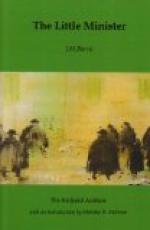I could hear that he was growing impatient, though so far he had been more indulgent than I had any right to expect.
“It can all be put into a sentence,” I said calmly. “Margaret married Adam Dishart, and afterwards, believing herself a widow, she married me. You were born, and then Adam Dishart came back.”
That is my whole story, and here was I telling it to my son, and not a tear between us. It ended abruptly, and I fell to mending the fire.
“When I knew your mother first,” I went on, after Gavin had said some boyish things that were of no avail to me, “I did not think to end my days as a dominie. I was a student at Aberdeen, with the ministry in my eye, and sometimes on Saturdays I walked forty miles to Harvie to go to church with her. She had another lover, Adam Dishart, a sailor turned fisherman; and while I lingered at corners, wondering if I could dare to meet her and her mother on their way to church, he would walk past with them. He was accompanied always by a lanky black dog, which he had brought from a foreign country. He never signed for any ship without first getting permission to take it with him, and in Harvie they said it did not know the language of the native dogs. I have never known a man and dog so attached to each other.”
“I remember that black dog,” Gavin said. “I have spoken of it to my mother, and she shuddered, as if it had once bitten her.”
“While Adam strutted by with them,” I continued. “I would hang back, raging at his assurance or my own timidity; but I lost my next chance in the same way. In Margaret’s presence something came over me, a kind of dryness in the throat, that made me dumb. I have known divinity students stricken in the same way, just as they were giving out their first text. It is no aid in getting a kirk or wooing a woman.
“If any one in Harvie recalls me now, it is as a hobbledehoy who strode along the cliffs, shouting Homer at the sea-mews. With all my learning, I, who gave Margaret the name of Lalage, understood women less than any fisherman who bandied words with them across a boat. I remember a Yule night when both Adam and I were at her mother’s cottage, and, as we were leaving, he had the audacity to kiss Margaret. She ran out of the room, and Adam swaggered off, and when I recovered from my horror, I apologized for what he had done. I shall never forget how her mother looked at me, and said, ‘Ay, Gavin, I see they dinna teach everything at Aberdeen.’ You will not believe it, but I walked away doubting her meaning. I thought more of scholarship then than I do now. Adam Dishart taught me its proper place.
“Well, that is the dull man I was; and yet, though Adam was always saying and doing the things I was making up my mind to say and do, I think Margaret cared more for me. Nevertheless, there was something about him that all women seemed to find lovable, a dash that made them send him away and then well-nigh run after him. At any rate, I could have got her after her mother’s death if I had been half a man. But I went back to Aberdeen to write a poem about her, and while I was at it Adam married her.”




